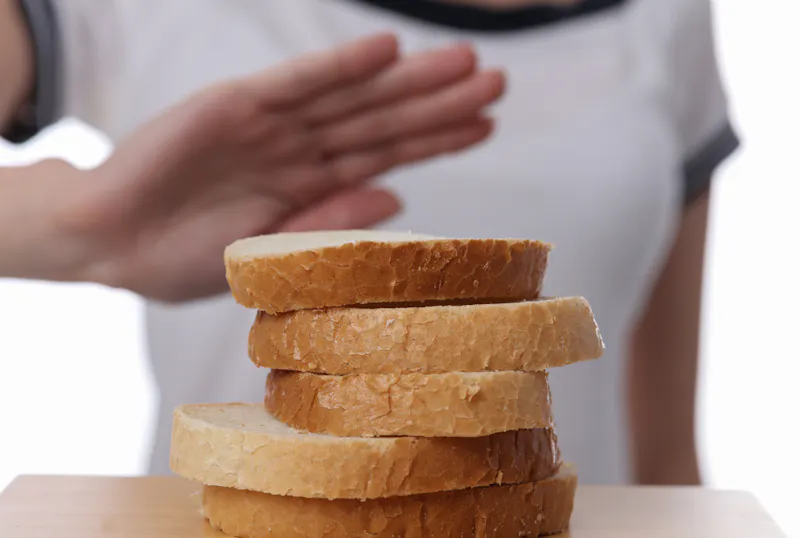Coeliac disease
What's covered?



Coeliac disease is a common autoimmune condition affecting around 1 in 100 people in the UK. You can develop it at any age — even if you’ve had no problems with gluten for most of your life. Unfortunately, there’s no cure for it, but the good news is that there are many things you can do to manage your symptoms through your diet.
What is coeliac disease?
Coeliac disease is when your immune system starts to attack your body’s tissues when you eat gluten. This leads to gut damage, which makes it difficult to absorb nutrients like vitamin B12 and iron.
Find out more about gluten.
What are the symptoms of coeliac disease?
Coeliac disease causes painful, uncomfortable symptoms associated with your gut. This includes:
- diarrhoea
- stomach ache
- indigestion
- constipation
- bloating
- nausea or vomiting
Coeliac disease can also cause other symptoms, like:
- tiredness
- weight loss
- an itchy rash on parts of your body, including your elbows, knees, back, buttocks, and scalp
- joint pains
- mouth ulcers
Many of the above symptoms are caused by your body not absorbing enough nutrients, which leads to deficiencies.
It might be helpful to keep a diary of your symptoms and show them to your GP if you think you have coeliac disease.
What causes coeliac disease?
The exact causes of coeliac disease are unknown. But it might be linked to a combination of your genetics and environment.
If you have coeliac disease, your immune system attacks your body whenever you eat gluten.
This attack on your body damages your small intestine, which then causes symptoms affecting your stomach, and symptoms linked to nutrient deficiencies.
How is coeliac disease diagnosed?
If you think you might have coeliac disease, you should visit your GP so they can rule out any other conditions.
Usually, your GP will arrange for coeliac testing if:
- you have persistent symptoms not caused by anything else
- you have a parent, sibling, or child with coeliac disease
A coeliac test can include:
- blood tests to check for antibodies — like anti-tissue transglutaminase (tTG), anti-endomysium (EMA), and anti-deamidated gliadin peptides (DGP)
- taking a small sample of tissue from your intestine so it can be examined under a microscope (a biopsy)
- more blood tests to check your levels of iron, vitamins, and minerals
How to manage coeliac disease
Unfortunately, there’s no cure for coeliac disease. Instead, you’ll have to manage your symptoms by following a strict gluten-free diet and paying attention to nutrient deficiencies.
Follow a gluten-free diet
When you’re diagnosed with coeliac disease, you’ll need to stop eating any foods with gluten. This will prevent damage to your small intestine, which causes symptoms like stomach aches and diarrhoea.
Gluten is a wheat protein that acts as a binding agent found in foods like:
- bread
- pasta
- cereal
- pies
- gravies and sauces
- cakes and pastries
Unless you can find gluten-free versions, it’s best to avoid all these foods..
Look out for unexpected sources of gluten, like soy sauce, beer and brewers yeast.
You can find gluten in some non-food items — like lipstick, some medicines, and postage stamps.
You can also ingest tiny amounts of gluten when gluten-free foods are prepared with other foods or served with the same utensils as food containing gluten.
Foods you can safely eat include:
- gluten-free flour — like rice, corn, and soy
- fresh, frozen, and canned fruit and vegetables
- dairy — like milk, cheese, plain or fruit yoghurt (without toppings), soya milk, rice milk, or nut milks
- protein — like unprocessed meat, fish (without batter or breading), beans, pulses, lentils, nuts, and eggs
- carbohydrates — like potatoes, rice, rice noodles, cassava, corn, millet, buckwheat, quinoa, teff, and gluten-free oats
While oats don’t contain gluten, some people with coeliac disease avoid them because they can easily get cross-contaminated.
Ensure you’re getting enough nutrients
Malabsorption and malnutrition are common complications caused by coeliac disease. This happens because your body doesn’t fully absorb nutrients, and that can lead to certain deficiencies which can cause:
- iron-deficiency anaemia
- vitamin b12 and folate deficiency anaemia
Malnutrition happens when your body lacks essential nutrients. Severe malnutrition can cause:
- feeling tired all the time
- dizziness and confusion
- feeling cold
- struggling to concentrate
- getting ill often and taking longer to get better
- wounds taking longer to heal
You can treat malnutrition by increasing your calories and taking a supplement for your specific deficiency. You can check for deficiencies by doing regular vitamin and nutrient blood tests.
Your GP will give you advice on improving your nutrient levels to ensure they’re optimal. This might involve taking supplements, like vitamin D and vitamin B12.
Durazzo, M., Ferro, A., Brascugli, I., Mattivi, S., Fagoonee, S., & Pellicano, R. (2022). Extra-Intestinal Manifestations of Celiac Disease: What Should We Know in 2022? Journal of Clinical Medicine, 11(1), 258. MDPI AG. Retrieved from http://dx.doi.org/10.3390/jcm11010258
Ludvigsson, J. F., Bai, J. C., Biagi, F., Card, T. R., Ciacci, C., Ciclitira, P. J., ... & BSG Coeliac Disease Guidelines Development Group. (2014). Diagnosis and management of adult coeliac disease: guidelines from the British Society of Gastroenterology. Gut, 63(8), 1210-1228.
British Dietetic Association. Coeliac disease and gluten-free diet: Food Fact Sheet. Retrieved 13 July 2022 fromhttps://www.bda.uk.com/resource/coeliac-disease-and-gluten-free-diet.html
National Health Services. Coeliac disease. Retrieved 13 July 2022 from https://www.nhs.uk/conditions/coeliac-disease/